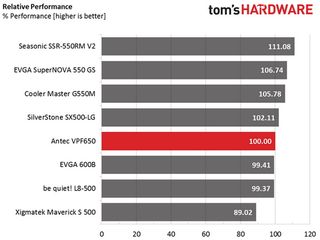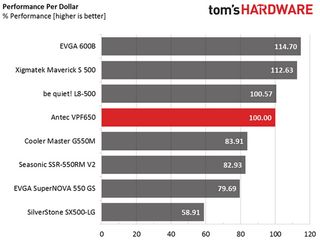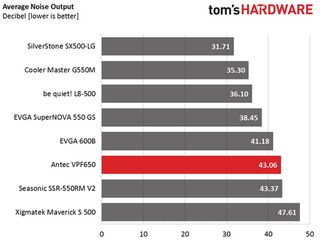Antec VPF Series 650W PSU Review
Antec's VPF650 is a budget PSU made by Delta Electronics to achieve high-performance-per-dollar. In the US, the VPF units are sold under the EarthWatts Green series.
Why you can trust Tom's Hardware
Performance, Performance Per Dollar And Noise Ratings
Performance Rating
The following chart shows the total performance rating of the PSU, comparing it to other units we have tested. To be more specific, the tested unit is shown as 100 percent, and every other unit's performance is shown relative to it.

Thanks to its good ripple suppression, the VPF650 takes the lead from the rest of the Bronze-rated units we compared it to, with the exception of the CM G550M. On top of that, we shouldn't forget that this PSU uses high-quality capacitors, which allows it to retain good performance over time.
Performance Per Dollar
The following chart may be the most interesting to many of you because it depicts the unit's performance-per-dollar score. We looked up the current price of each PSU on popular online shops and used those prices and all relative performance numbers to calculate the index. If the specific unit wasn't available in the United States, we searched for it in popular European Union shops, converting the listed price to USD (without VAT). Note that all of the numbers in the following graph are normalized by the rated power of each PSU.

Strangely enough, in the U.S. market, Antec’s EarthWatts Green (EA-650) costs more than the VPF650 does in the E.U. For most PSUs, this is usually the other way around. Still, even with a $75 price tag, the VPF650 achieves a high performance-per-dollar score that's close to the scores of other Bronze-rated units. Xigmatek's PSU is the only exception.
Noise Rating
The chart below depicts the cooling fan's average noise over the PSU's entire operating range, with an ambient temperature between 28 and 30 °C (82 to 86 °F).

In the noise output area, the Antec VPF650 is a lousy performer. Its overall noise exceeded 43 dB(A). Clearly, you cannot have it all—budget price, good performance, reliability and low noise output. So, if you want a silent PSU, you better look for a higher efficiency rating. You'll just have to pay more for it.
Current page: Performance, Performance Per Dollar And Noise Ratings
Prev Page Ripple Measurements Next Page Pros, Cons And Final VerdictStay on the Cutting Edge
Join the experts who read Tom's Hardware for the inside track on enthusiast PC tech news — and have for over 25 years. We'll send breaking news and in-depth reviews of CPUs, GPUs, AI, maker hardware and more straight to your inbox.
Aris Mpitziopoulos is a Contributing Editor at Tom's Hardware US, covering PSUs.
-
CTurbo I hope Delta is not going to get out of the consumer psu business completely. They've been one of my go-to oems for years. Top notch reliability.Reply -
Onus Antec has been one of my go-to standards for years as well. Though it has been surpassed in efficiency, I may need to put my SG-650 in my will because of its anticipated durability.Reply -
2Be_or_Not2Be When the author says "... Delta no longer has an interest in this market..." - what market is he talking about? I seem to recall that quite a few of my Dell servers had Delta OEM PSUs, and I think a number of Dell desktops had custom Delta PSUs as well. So is it only the consumer market that they don't want to supply anymore?Reply -
iam2thecrowe Reply16537381 said:When the author says "... Delta no longer has an interest in this market..." - what market is he talking about? I seem to recall that quite a few of my Dell servers had Delta OEM PSUs, and I think a number of Dell desktops had custom Delta PSUs as well. So is it only the consumer market that they don't want to supply anymore?
probably. There is now too much competition in the consumer psu market for it to be really profitable for some companies. It would make sense if a company only wanted to do anything other than generic PC ATX psu's, because they can charge a lot more for it. -
Aris_Mp Yeap Delta is away from consumer market. They mostly make OEM PSUs now. As far as I know only Antec has a contract with them for desktop PSUs.Reply
